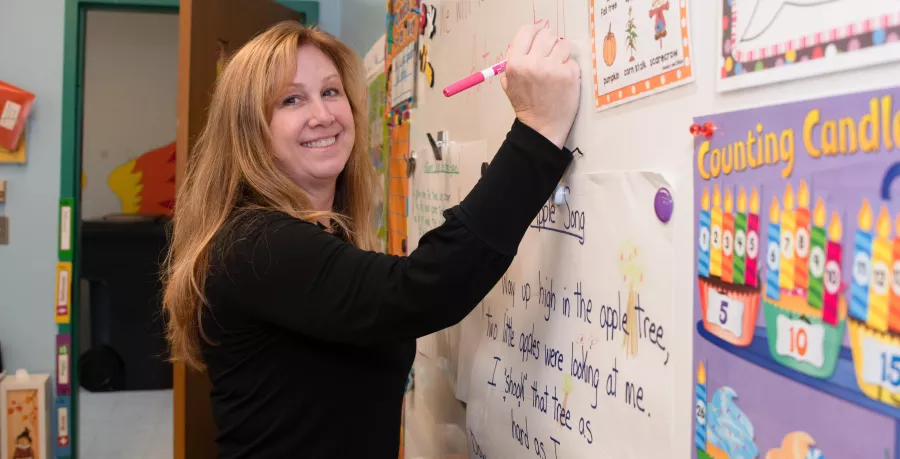
Though her father had recently passed away from pancreatic cancer, there was no breast cancer history in her family, and her life as a second-grade teacher at Lowell’s Bartlett Partnership School and a mother of four is busy.
Then she recalled a neighbor who recently died from breast cancer in her 50s and would never meet her grandkids. So she decided to make the time. But even when she got a call asking her to come back for a follow-up appointment, she wasn’t concerned. She’d been asked to come back once before and everything was fine.
The call she got after her follow-up left her “blindsided.” Lowell General’s Breast Cancer Risk Assessment Program uses a woman’s personal history and her imaging results to identify individuals at higher risk of a breast cancer diagnosis. Advanced 3-D Imaging can also help identify pre-cancerous areas, and MacLean was sent for a biopsy that showed a pre-cancerous lesion. Suddenly she was being referred to a surgeon to have it removed.
“I was blind-sided,” MacLean says. “I look back now and think, was I too busy to live?”
Just a few weeks after her initial mammogram, she underwent successful surgery to remove the lesion. Throughout the process, she says she never had to think about what’s next.
“I was too busy trying to process everything, but they had a plan for me,” she says.
The hope for MacLean and her caregivers is that she will never have cancer. The odds of that happening are significantly decreased now that she is part of Lowell General’s Breast Cancer Risk Assessment Program, where experts will monitor her closely as long as necessary.
On her first visit to the clinic, she met with Jennifer Gilliatt, a breast care nurse practitioner, who walked her through all the ways she can keep breast cancer away for the rest of her life.
“Now the focus is on increased screening, as well as risk reduction,” Gilliatt says. “That can be done through medication and lifestyle factors, including nutrition, exercise, maintaining a healthy weight and decreasing alcohol. The patient is directly involved in their care and risk reduction.”
Diane’s increased screening includes an annual mammogram as well as an annual breast MRI, which alternate every six months.
The clinic also connected Diane with genetic testing, which she wanted to do to help her daughter know her genetic risk. Gilliatt says women are often surprised to learn that their local hospital offers this level of cancer care in a community setting.
“What we’re doing is incredibly unique,” she says.
MacLean raves about the care she received, from the initial imaging to scheduling to the surgeons and then the high-risk clinic, and feels prepared to face whatever comes next.
“Everything they tell you doesn’t defeat you, it empowers you,” MacLean says. “And to me, knowledge is power. If I didn’t experience it, I wouldn’t know care could be this way.”